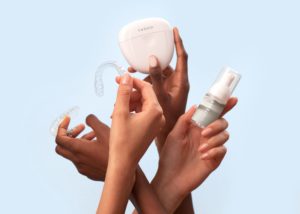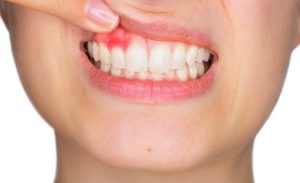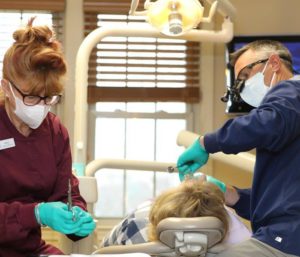DEFINE YOUR DENTAL OBJECTIVES
April 25, 2022
 Let’s use this hypothetical situation: You have not been to a dentist in a while (pick a time frame), you are well aware you need some dental work, you were given the recommendation of a dentist by a friend…..and, you decide to visit that dentist and four other dentists to compare and make a decision who is the best fit for you. (I realize that most people don’t want to and/or don’t have the time to visit five dentists….but play along).
Let’s use this hypothetical situation: You have not been to a dentist in a while (pick a time frame), you are well aware you need some dental work, you were given the recommendation of a dentist by a friend…..and, you decide to visit that dentist and four other dentists to compare and make a decision who is the best fit for you. (I realize that most people don’t want to and/or don’t have the time to visit five dentists….but play along).
You already have an idea of what you are looking for. It might be the dentist who says you need the least. It might be the dentist who is the cheapest. It might be the dentist who is closest to where you live. It might be the dentist who gives you the most options, or maybe the least. It might be the dentist who listens to you the best. Be prepared, because you are likely to hear a few different styles/opinions visiting five dentists.
Some practices may feel “clinical and efficient”, while others feel somewhat more home spun and laid back. The dentist’s personality and experience are reflected in his or her treatment preferences as well. The fact that different dentists will suggest different plans to treat your condition does not necessarily mean that one plan is better than another. Have an open mind and play an active role in the treatment planning process.
It is important to remember that there are numerous ways to treat the same situation, and it is always important for the dentist to tailor the treatment plan for each patient’s specific circumstances. A major part of those circumstances may be financial, and since different treatment plans can vary a great deal in cost, it is important for the dentist to discuss costs and options for payment.
Think of treatment plans like various models of cars offered by different dealers. All of the models are new, have warranties and will work well out of the lot. The higher end models, however, have some advantages not found in the less expensive models. Some options add years to the life of the car. Some add to the appearance and enjoyment of driving it. Having said that, dentistry is not a commodity. There are many factors that need to be taken into consideration when choosing your provider or the treatment you choose for yourself.
What makes sense for you? What are your objectives? Saving a badly damaged tooth with a root canal and a crown may preserve it for a long time, but what are the circumstances of how the tooth got to that point? If you haven’t been to a dentist in many years and have many other dental needs, does it make sense?
We have so many great dental providers in our area. Think about what you are looking for in a dental care team Read that list in the second paragraph again.
The focus should be on long-term objectives and prevention. If you are a regular dentist-goer and have a dentist you like, you’re all set. If you haven’t been in a while, consider making the decision to change how you look at your dental health. Start with finding a place that fits your particular needs, and make the commitment to make routine preventive dental care part of your life.
Dr. St. Clair maintains a private dental practice in Rowley and Newburyport dedicated to health-centered family dentistry. He has a special interest in treating snoring, sleep apnea and TMJ problems. If there are certain topics you would like to see written about or questions you have, please email them to him at jpstclair@stclairdmd.com
A SILENT DISEASE
April 19, 2022
 A while back, The Boston Globe ran an article entitled “Advice for all ages: Don’t skip the dentist.” It started with, “A team of researchers from London and the University of Connecticut announced that aggressive treatment of gum disease can improve the function of blood vessel walls in the body, potentially reducing the risk of heart attacks.”
A while back, The Boston Globe ran an article entitled “Advice for all ages: Don’t skip the dentist.” It started with, “A team of researchers from London and the University of Connecticut announced that aggressive treatment of gum disease can improve the function of blood vessel walls in the body, potentially reducing the risk of heart attacks.”
The concept is nothing new. We have known for years of the mouth-body connection with health. However, the key to the statement above is “aggressive treatment of gum disease”.
What does aggressive treatment of gum disease mean? Basically, it means that instead of watching and waiting for resolution of gum problems on their own, whatever treatment is needed to achieve gum health should be performed.
Periodontal (gum) disease is a silent disease. This means that it does not hurt. Over 75% of the population has some form of periodontal disease. Whether you have early stages of the disease or advanced periodontal involvement, you have periodontal disease.
Any form of this disease is potentially affecting your overall systemic health. The goal in any case is to become periodontally healthy, whether it involves simply seeing a dentist more frequently or surgery.
It is easy for patients, and even dentists, to watch and wait as opposed to taking action. “Aggressive treatment of gum disease” means that if the disease is identified, it needs to be addressed. Let’s get it right out in the open – Once you have periodontal disease, and even after it is treated, it will always return unless you follow a strict regimen of home care and professional care…….for your entire life.
Even the smallest amount of inflammation in your mouth is gum disease. Periodontal disease is a chronic inflammatory process. As the article states, “Chronic inflammation anywhere, makes the body release nasty chemicals called cytokines that have been linked to diabetes and heart disease.” It goes on to say, “Cytokines can also trigger inflammation in artery walls, raise blood pressure, worsen cholesterol levels, and increase blood clotting, which can lead to potentially fatal heart attacks.” This also includes strokes. “Pregnancy complications, too, have been linked to gum disease, perhaps because chronic inflammation leads to high levels of a hormone-like substance called prostaglandin E-2, which can induce labor.”
No one wants to hear that they need treatment for something. It is even harder to get someone to “treat something” that does not hurt and is seemingly not affecting their daily life.
The fact of the matter is, periodontal disease is a disease. Diseases need to be treated or they will affect and possibly even shorten your life. Periodontal disease is no exception. And remember, “aggressive treatment” does not mean watch and wait to see if it goes away. It won’t go away on its own – I promise.
Dr. St. Clair maintains a private dental practice in Rowley and Newburyport dedicated to health-centered family dentistry. He has a special interest in treating snoring, sleep apnea and TMJ problems. If there are certain topics you would like to see written about or questions you have, please email them to him at jpstclair@stclairdmd.com
EAT YOUR FRUITS & VEGTABLES
April 11, 2022
 I’m sure that at one point in your life you heard a parent or grandparent say, “eat your fruits and vegetables.” It’s one of those things that always made sense to me – how could you go wrong eating things that nature has provided for us growing in the ground? As with most things, as time goes on, we learn more about why things are good or bad for us.
I’m sure that at one point in your life you heard a parent or grandparent say, “eat your fruits and vegetables.” It’s one of those things that always made sense to me – how could you go wrong eating things that nature has provided for us growing in the ground? As with most things, as time goes on, we learn more about why things are good or bad for us.
Over the past 30 years or so, research has been conducted to better understand why fruits and vegetables are so important to good health. Here are some highlights of that research:
#1 – Better able to maintain the normal, healthy elasticity of arteries, even after a high-fat meal; maintain normal levels of homocysteine, a waste product associated with heart health; and demonstrated positive effects on several other measures of vascular health.
#2 – Supports key measures of immune system function.
#3 – Helps improve skin hydration, skin thickness, and circulation in skin capillaries.
#4 – Helped improve gum health and diminish bleeding in a periodontal study.
#5 – Antioxidants from fruits and vegetables fight oxidative stress and help you maintain optimal health.
#6 – DNA may become damaged and fragile when exposed to oxidative stress; antioxidants from fruits and vegetables can help maintain healthy DNA.
I think it is safe to say that fruits and vegetables are good for us. They are certainly better for our bodies than all the processed foods available. The big problem most people have, including me, is that it is difficult to consume the amount of fruits and vegetable that we should daily.
In the 1980’s-90’s juicing became a craze in an effort to get more fruits and vegetables into our diet. But juicing, while very healthful, can be expensive, time-consuming, and messy. It is a tough thing to stick with. Enter a product called Juice Plus+®.
I am a fairly big skeptic when it comes to “products” that are supposed to make me healthier. The difference with Juice Plus+ is that the only ingredients in the product are concentrated fruits and vegetables. In fact, the research I mentioned above was all done using Juice Plus+.
One of the bigger selling points for me has been the research on chronic inflammation. Re-read the research in bullet point #4. We know that a significant percentage of the population has some form of gum disease. Gum disease is chronic inflammation. Those with gum disease typically have higher systemic markers of inflammation.
Chronic systemic inflammation is invisible, and can contribute to an increased risk for developing chronic health conditions. Investigators at the University of South Carolina found Juice Plus+ significantly decreased levels of three key biomarkers of inflammation.
I have been taking Juice Plus+ for over ten years and it is one of those rare products that I promote because of the research behind it. To find out more about Juice Plus+ you can “Google” it or drop me an email.
Dr. St. Clair maintains a private dental practice in Rowley and Newburyport dedicated to health-centered family dentistry. He has a special interest in treating snoring, sleep apnea and TMJ problems. If there are certain topics you would like to see written about or questions you have, please email them to him at jpstclair@stclairdmd.com
ASK THE DENTIST
April 4, 2022
 There are very few dental practices that still use analog film and chemicals to produce dental x-rays. With digital technology around for decades, and improving along the way, there really is no excuse not to be digital.
There are very few dental practices that still use analog film and chemicals to produce dental x-rays. With digital technology around for decades, and improving along the way, there really is no excuse not to be digital.
However, patients still often express concern with overexposure from radiation from dental x-rays. While I could bore you with statistics, to put it into perspective, it would take almost 400 dental x-rays in one year to equal the amount of radiation a person picks up from background sources each year.
Here are a few questions answered about dental x-rays:
I had a dental x ray while I was pregnant. I am worried that my unborn child might have been exposed to the radiation. Can you please tell me if there are any risks to my baby from this?
There is no information suggesting any risk to an unborn child from dental x-rays received by the mother. We were taught in dental school to avoid dental x-rays on pregnant patients. However, with newer technology the radiation dose to the fetus is insignificant. Prudent practice would dictate limiting x-rays on pregnant women, but there is absolutely no harm in taking x-rays if needed to diagnose a problem.
Is there residual radiation in a room after a dental radiograph has been taken?
X-rays cease to exist when the machine is switched off, much like the light from a light bulb when it is turned off. No residual radiation remains.
How much has dental x-radiation been studied and how concerned should I be about having dental x-rays done? Is there a limit on how many I can have?
We now have very complete information on patient radiation doses from dental x-rays. They are among the lowest radiation dose exams of any diagnostic radiologic procedure in the healing arts. Current practices deliver patient doses from a full-mouth series of intraoral films (usually 14-18 films) that are less than what a person receives in a month from natural environmental sources (commonly called background exposure).
Doses from bitewing or panoramic films are even less. New technology is reducing the doses still further. There is no limit on how many dental x-rays you can have. The decision to have a dental x-ray is based on the benefit of knowing whether or not there is a cavity, crack, or some other abnormality. The decision to have them is based on what you and your dentist agree on being best for your specific situation.
I recently had some dental x rays and the operator forgot to place the lead apron on me. Is this a problem?
Use of the lead apron to protect the patient undergoing dental radiographic examination was recommended some 50 years ago, when equipment was crude. This was because x-ray beams were not restricted to the area of clinical interest, beams were not filtered, and x-ray film was slower, causing radiation exposures 10 to 100 times higher than received today. With the current technology reducing radiation exposure significantly and the beam limited only to the area of interest, there is little or no measurable difference in whole-body dose whether a lead apron is used or not. The lead apron is no longer regarded as essential although some consider it a prudent practice, especially for pregnant and potentially pregnant patients.
If you have any other questions on dental x-rays, please e-mail them to me.
Dr. St. Clair maintains a private dental practice in Rowley and Newburyport dedicated to health-centered family dentistry. He has a special interest in treating snoring, sleep apnea and TMJ problems. If there are certain topics you would like to see written about or questions you have, please email them to him at jpstclair@stclairdmd.com







